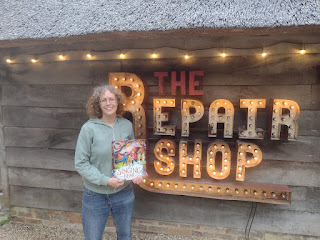BRANCHING OUT Amy Sparkes
In the first of a brand new series which explores ways in which SCBWI members have branched out into multiple areas of creativity, Production Editor, Tracy Curran, talks to children's author and 'Story Godmother' Amy Sparkes about venturing into scriptwriting and film production.
For me, it all stems from a passion for ‘storytelling’. I wrote stories, songs, poems and plays throughout my school years but it never occurred to me that writing could be a career, and I was never encouraged to think that it could be. I only started writing for children after the birth of my second child. A few years later, I approached Writing Magazine and we’ve been working together for over 10 years now, and run two writing competitions together. It was then I realised how much I loved writing about writing, and how much I loved encouraging other writers.
I’ve been very close to death a few times in my life and I’m very aware that time is short. I have no intention of reaching the end feeling I haven’t given my dreams their best shot. And I want to help empower others to give their dreams their best shot, too. So I set up Story Godmother, making it as affordable and accessible as I can, which is why writers can dip in and out rather than have to make a large one-off or regular financial commitment.
Scriptwriting is a more recent storytelling experiment! I’ve always been a very visual writer, and the more I delved into scriptwriting, the more I loved it. Last year my husband and I set up a film production company, Sword and Fiddle, to help the process along, and we’re just about to wrap on our very first production, all shot on location, which has been an incredible experience. We’re also now in pre-production of our first narrative short film.
Amy is the author of The Repair Shop stories as well as many others
Apart from financial reasons, what is the appeal of doing so many different things? Does anything take priority?
I find it so satisfying to tap into different areas of creativity and challenge myself. It stops me from getting stuck in a rut. I’m always learning, always growing, and I find that incredibly rewarding. Screenwriting and production are far more collaborative than writing books, so it’s a different way of working, which brings variety.
I find it so satisfying to tap into different areas of creativity and challenge myself. It stops me from getting stuck in a rut. I’m always learning, always growing, and I find that incredibly rewarding. Screenwriting and production are far more collaborative than writing books, so it’s a different way of working, which brings variety.
Balancing many things is not always easy and it’s important to keep a careful eye on schedules. Deadlines always take priority and sometimes it can be quite tight. However, being short on time means I rarely procrastinate – I have no choice but to get on with it, so I’m probably more productive!
In the rare absence of deadlines, I’m very much guided by passion. I think a lot with my heart and have a very clear idea of why I want to write this book or make this film. If I’m deciding between projects, I’ll think about what fires me up right now. This is where my heart is. Having said that, there are always bills to pay! So sometimes I have to weigh up the financial merit of projects, too.
Why did you decide to branch out into scriptwriting and film production?
It actually happened by accident because I had an idea which I loved and couldn’t shake (which is now a film in development). I fell in love with the characters, the idea and the world and decided I should do something with it. I started from scratch and learnt the craft, and found I absolutely loved it.
At the time, I thought it would be a one-off screenwriting project, but the lid began to open and I’m now working on an original TV show, and some more film ideas.
 |
| Amy has set up a film production company, Sword and Fiddle Productions, with her husband |
What have been the highlights and the challenges of diversifying?
For me the highlights are achieving new skills and dreaming bigger dreams. I’ve found myself in curious situations, from meeting with Hollywood execs to working with one of my favourite actors (a particularly funny highlight was when he messaged me at exactly the same time that I was watching him on TV).
The main challenge for me personally is managing my time and keeping every plate spinning. But being in production has forced me to become more organised – schedules are tight. If we’re filming at a certain time, I don’t want to let people down by being late. Amazingly, I now leave the house ON TIME for almost everything, which is a surprising bit of character development!
There are times it might be hard to juggle, but then I ask myself if I would rather be doing a different job? And the answer is no.
Are there any similarities between scriptwriting and writing for children? Does one skill help the other?
Scriptwriting and book-writing use different skills, but there is definitely overlap. TV series for younger children are quite like creating chapter books. Films require the highly visual writing and ruthless brevity of picture books. There are also lots of transferable skills such as idea creation, character development, tight plotting, exploring theme and projecting voice.
What advice would you have for anyone interested in scriptwriting or in trying new things in general?
Absolutely try new things. Whether that is writing for different age ranges, in different formats or trying a different creative practice. I had no idea I’d fall in love with screenwriting as much as I have. And I never dreamt I’d be running a production company. Creative surprises are often waiting to happen. Poke your head around the corner and see what’s there.
What is your ultimate goal in terms of branching out? Do you have a big picture of where you would like this journey to take you?
Ultimately, I would love to keep learning, experimenting, and growing in all the disciplines I work in – and probably one or two new ones! When I handed my first script (now the film in development) over to an industry professional for the first time, he read it, and told me, “That’s bold.” And to me, that was the best compliment. I want to keep being bold, keep pushing the boundaries for myself and experimenting with the genres I write in. I don’t want it to be safe – I want it to be an adventure.
Alongside that, my motto is ‘create something good and make a difference while you’re doing it’. Most of my books donate a percentage of author royalties to charity, and I would like my screenwriting and production company to have a positive presence in the world, both with its creative content and in the way that we work (more info on our values here: About Sword and Fiddle). We’ve recently set up the David Banks Performers Fund to help actors-in-training who are financially disadvantaged. Coming from a low-income and disadvantaged background, I know how hard it can be. And creative industries are tough!
There will be ebbs and flows, twists and turns, and a great deal of unpredictability when you explore new avenues. But for me, that is part of the joy. I don’t really know where this journey will take me, or what I’ll discover along the way, but I reckon it’ll be a lot of fun finding out.
Thank you so much for talking to us, Amy
*Header image: in-house collaboration between Ell Rose and Tita Berredo
*
Amy Sparkes lives in Devon. To find out more information about her work, please check out her website, amysparkes.co.uk, or The Story Godmother.
Facebook: Amy Sparkes Author
Instagram: sparkes_amy
Bluesky: amysparkes.bsky.social
*
Tracy Curran is Production Editor for Words & Pictures and enjoys writing picture books, young fiction and lower middle grade novels. Known as Little Cornish Writer, you can find her on Instagram, Twitter and Facebook.
She also enjoys reviewing children's books on her blog The Breadcrumb Forest.
*
Tita Berredo is the Illustrator Coordinator of SCBWI British Isles and the Art Director of Words & Pictures. Contact her at: illuscoordinator@britishscbwi.org












No comments:
We love comments and really appreciate the time it takes to leave one.
Interesting and pithy reactions to a post are brilliant but we also LOVE it when people just say they've read and enjoyed.
We've made it easy to comment by losing the 'are you human?' test, which means we get a lot of spam. Fortunately, Blogger recognises these, so most, if not all, anonymous comments are deleted without reading.